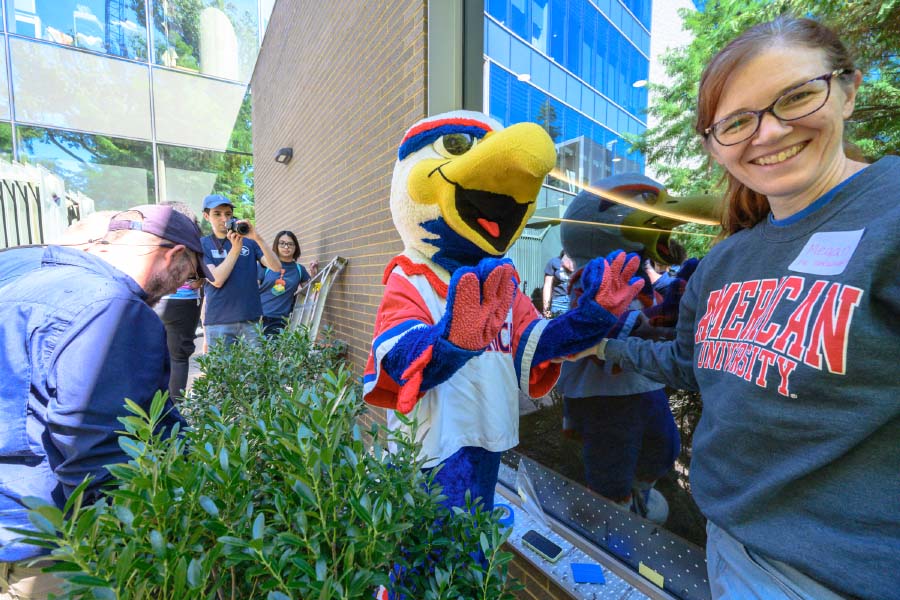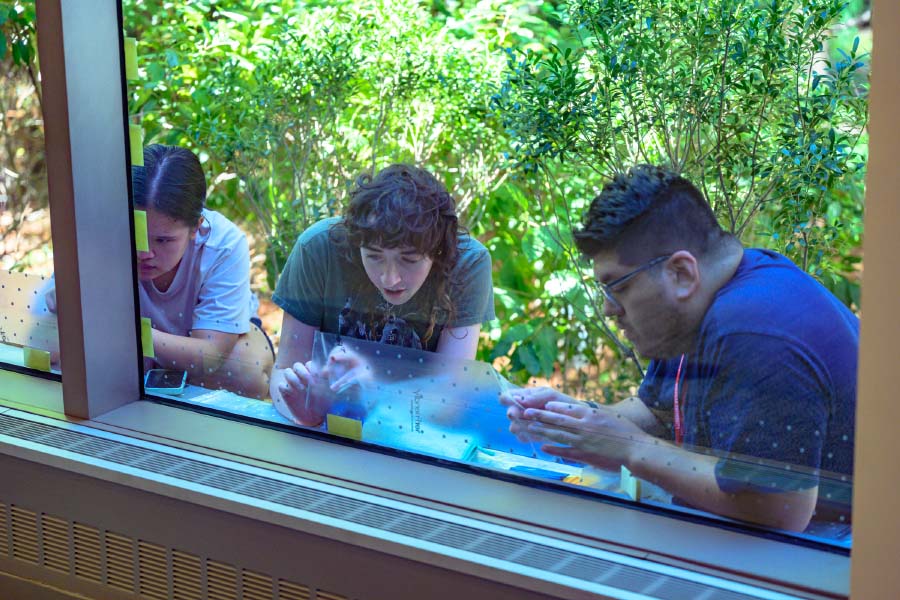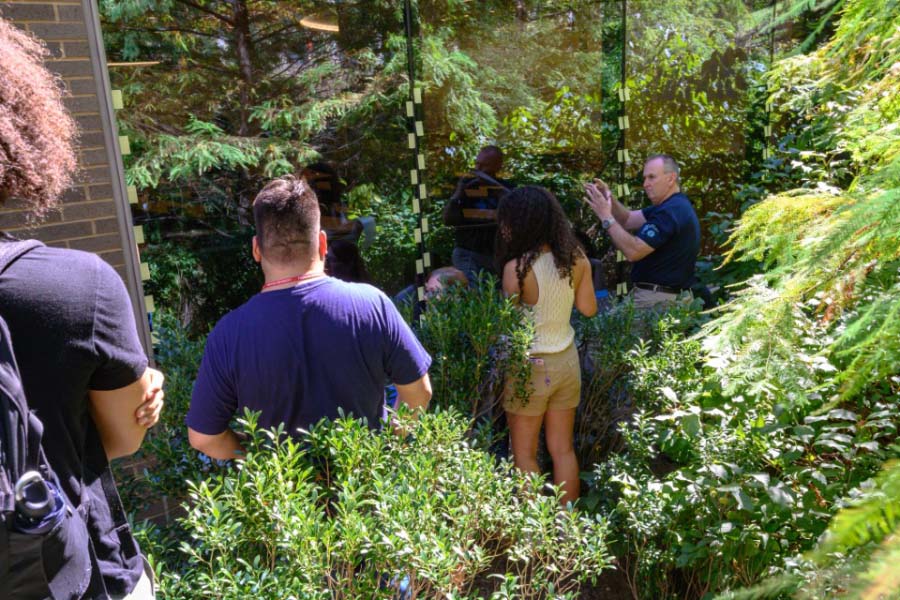As Millions of Birds Pass Through DC, AU is Working to Keep Them Safe
This fall, American University students, faculty, and staff are turning the Hall of Science into a safe haven for migrating birds. What started as student-led concern over bird strikes—when birds mistake reflective windows for open sky and crash into them—has grown into a collaborative project that reflects AU’s values of sustainability, innovation, and civic responsibility.
The effort is led by Biology Professor Chris Tudge, the Birders of AU, the Office of Sustainability, and dozens of student volunteers. Together, they’re applying small patterned decals to one of the Hall of Science’s expansive glass walls. These simple markings break up reflections so birds recognize the glass as solid, which prevents deadly collisions and keeps AU’s campus a safe stopover on their long migration journeys.
Dante Arminio, a dual-degree student in Environmental Science and Political Science (and president of the Birders of AU) volunteered at the event. “This is an incredibly important effort for bird conservation, especially during the migration season when bird strikes on windows are most common,” he says. “I felt so grateful to be involved in such an important activity to keep birds safe from human infrastructure.”
Even AU’s mascot Clawed showed up to cheer on the effort to protect their fellow feathered friends.
 Photo by Jeff Watts.
Photo by Jeff Watts.
Why It Matters
Each year, an estimated one billion birds in the United States die or are injured after colliding with reflective glass, according to a recent study by the American Bird Conservancy, Fordham University, and the NYC Bird Alliance. Many of these tragedies occur during migration season.
In Washington, DC, fall migration begins in August and peaks in October. During this time, millions of migratory birds—species like magnolia warblers, fox sparrows, scarlet tanagers, and kinglets—fly through DC on their way south for the winter. American University’s 84-acre arboretum—with more than 5,000 trees and 500 species of woody plants—provides vital food, water, and shelter along their journeys, making campus an important rest stop within the city. But even with this natural refuge, glass buildings can pose serious dangers to birds in flight. Projects like the Hall of Science window decals show how simple, thoughtful changes can have a powerful impact on wildlife safety.
 Students step in to place the decals on the Hall of Science window. Photo by Jeff Watts.
Students step in to place the decals on the Hall of Science window. Photo by Jeff Watts.
“This project illustrates how small changes can change the world,” says Linda Aldoory, dean of the College of Arts and Sciences. “When students and faculty work together to make even the smallest change, the difference can be powerful. This endeavor brings creativity, commitment, sustainability, partnerships, and engineering together, for a big impact.”
From Concern to Action
The project began when students and faculty noticed birds injured near the Hall of Science and reached out to the Office of Sustainability with their concerns. Tudge and the Birders of AU quickly joined forces with the office to explore options.
“The National Zoo recently applied similar decals to their animal enclosures,” explains Megan Litke, director of AU’s Office of Sustainability. “They were a wonderful resource as we began. They shared the products they used with Professor Tudge and offered to come help us learn to apply the the stickers.”
 Professor Tudge (far right) explains how the stickers will work. Photo by Jeff Watts.
Professor Tudge (far right) explains how the stickers will work. Photo by Jeff Watts.
The pilot project focuses on the window where the most bird collisions had been reported. Once the decals are fully installed, the team will collect feedback and evaluate the possibility of expanding to other campus windows.
The Office of Sustainability covered the cost of the decals, while students provided the hands-on labor. Though the first decals took some time to place, volunteers quickly improved their technique. “Now a strip only takes a couple of minutes,” says Litke. “If we expand to another building, we’ll be ready.”
A Campus Refuge
“I’m so excited to be a part of this project that students championed,” Litke says. “Protecting species on campus aligns well with AU’s long history of sustainability leadership. Birds, both migratory and resident, play an important role in ecosystems. And of course, many people simply love to watch and enjoy them. Protecting birds helps us all connect more deeply with the natural world.”
Litke also reminds the AU community that everyone can help keep birds safe during migration season—especially at night. Turning off unnecessary lights saves electricity and prevents fatal bird collisions. “It’s such a simple action,” says Megan. “Just by turning off lights, we’re protecting wildlife while also conserving energy—and giving migratory birds a clearer, safer path through the night.”